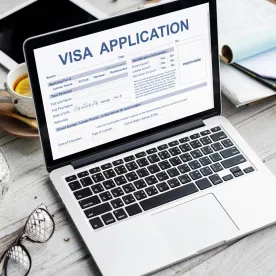Premium Processing
In immigration news, the U.S. Citizenship & Immigration Services (USCIS) announced on Tuesday, October 3, 2017 that it has resumed its premium processing program for all H-1B visa petitions. USCIS had previously suspended the program on April 3, 2017 in an effort to reduce overall H-1B processing times. Over the course of the past three months, USCIS had reinstituted the program for H-1B petitions subject to the annual quota, petitions filed on behalf of certain physicians in medically underserved areas, and certain quota-exempt petitions. All H-1B petitions filed under regular processing may now be converted to premium processing, a service that guarantees a 15-calendar day processing time. If action is not taken in that timeframe, USCIS will refund the petitioner’s premium processing service fee of $1,225 and continue with expedited processing of the application.
New 90-Day Rule
The U.S. Department of State’s (DOS) Foreign Affairs Manual (FAM) recently updated its guidelines for determining whether a visa applicant is inadmissible to the United States on grounds of misrepresentation. Under previous guidance, any foreign national who within 30 days of entry to the United States:
-
Engaged in unauthorized employment;
-
Enrolled in a full course of academic study without authorization and/or the appropriate
change of status; -
Entered in a status prohibiting immigrant intent to marry a U.S. citizen or Lawful Permanent
Resident (LPR) and take up residence in the United States; or -
Undertook any other activity for which a change of status or an adjustment of status would
be required, without changing or adjusting status would presumptively have engaged in willful misrepresentation and be deemed inadmissible.
Under the revised 9 FAM 302.9-4(B)(3)(g) and (h), the applicable standard has increased from 30 to 90 days. Although USCIS has not yet updated its Policy Manual to be consistent with the new DOS guidance, those changes are forthcoming. As a result, individuals who enter on the visa waiver program or on a nonimmigrant visa that does not permit immigrant intent should take note of the risk of marrying and taking up residence with a U.S. citizen within 90 days of entry. Change of status applicants should also beware of the risks associated with changing nonimmigrant status within 90 days of entry.
On behalf of the National Venture Capital Association and other plaintiffs, the American Immigration Council (AIC) has sued the Department of Homeland Security (DHS), challenging its delay of the start date of the International Entrepreneur Rule (IER). The IER would allow foreign entrepreneurs to travel to or stay in the United States to establish and grow new businesses that would hire U.S. workers, contribute to the U.S. economy, and benefit the United States as a whole. On July 11, 2017, DHS announced the effective date would be postponed from July 17, 2017 until March 14, 2018 in order to allow time to reconsider the rule in light of Executive Order (EO) 13767. In that order, President Trump directs that parole authority (the means by which IER applicants would enter the United States) be exercised on a case-by-case basis. The plaintiffs challenge that the delay is nothing more than a de facto repeal of the EB-6 rule and is contrary to the Administrative Procedure Act’s notice and comment requirements. (National Venture Capital Association v. Duke, 9/19/17.



 />i
/>i

